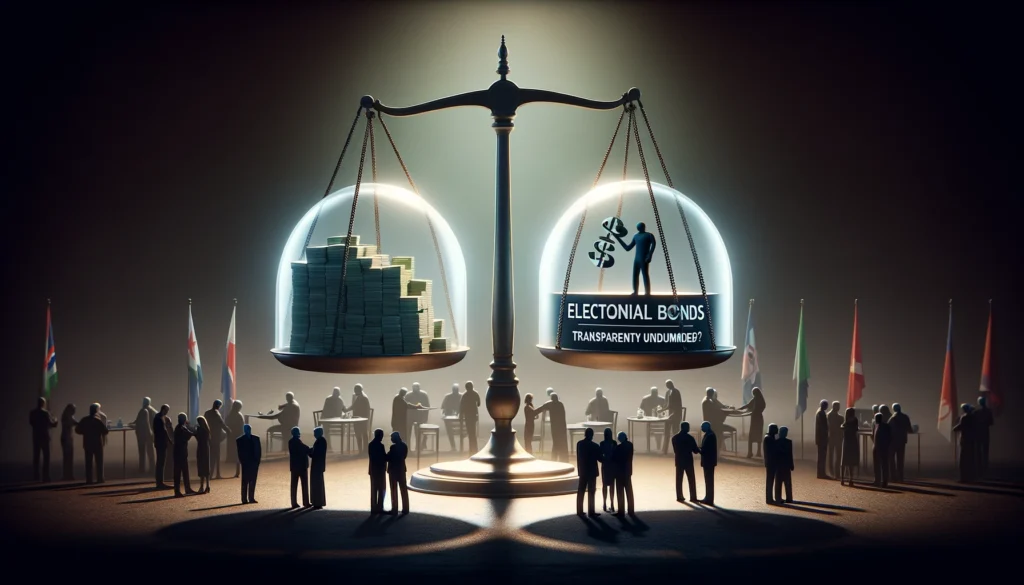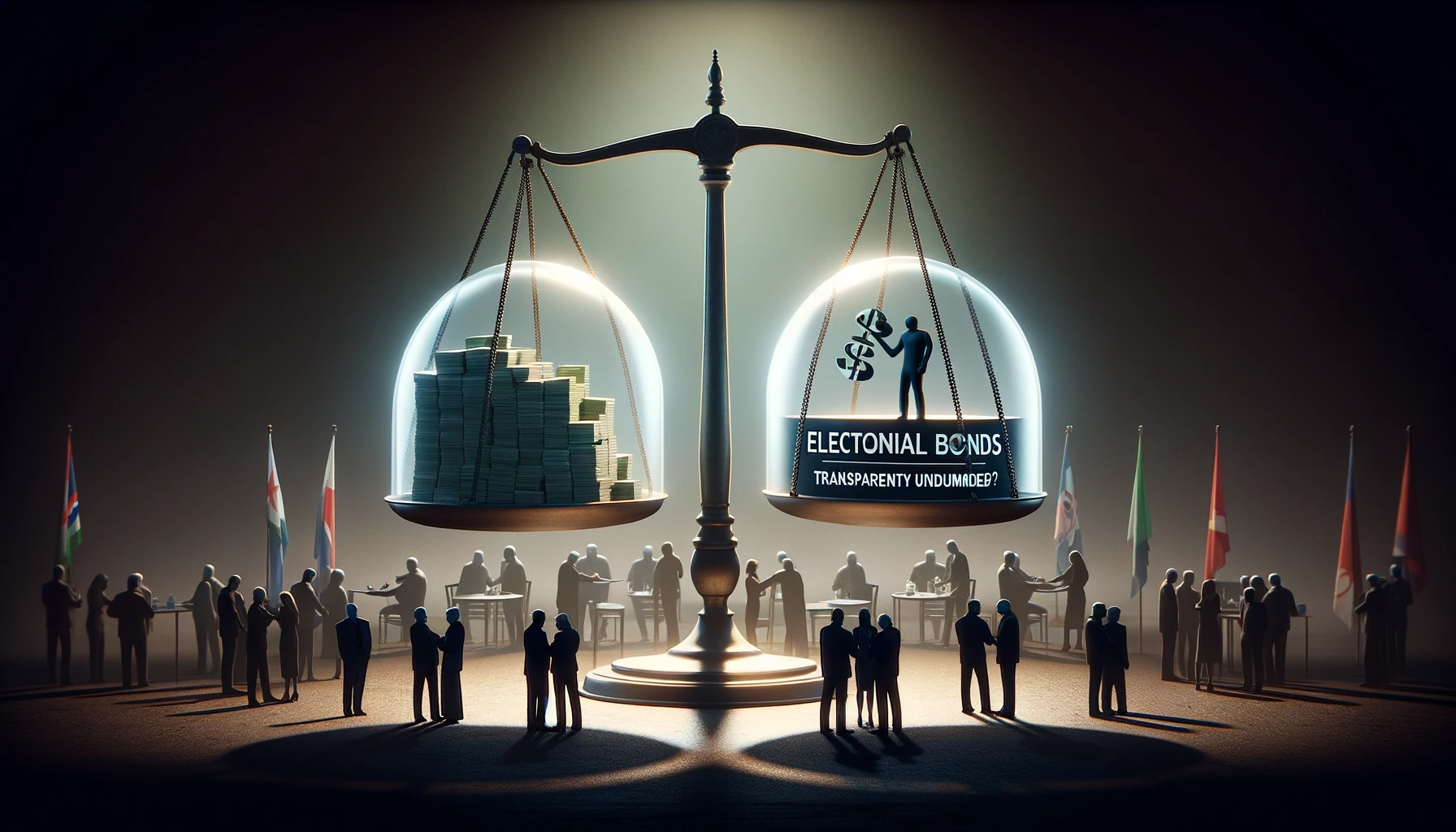Electoral bonds shroud political donations in secrecy. Imagine buying a gift for someone without anyone knowing who bought it or for whom. That’s the idea with these bonds, and they’ve got politicians, businesses, and watchdogs all talking.

Imagine you’re buying a secret gift for someone, and nobody else is supposed to know who bought it or for whom. Electoral Bonds are somewhat like that, but here, the ‘gifts’ are donations made to political parties, and the ‘someone’ is a secret to the public. Companies and businesses donate through these bonds because it allows them to support their preferred political parties without revealing their identity. It’s like supporting a friend in a talent show anonymously.
Why Do Bussinesses Give Donations To Polical Parties?
Imagine a world where businesses are like gardeners, and political parties are like different types of plants. Just as gardeners water the plants they want to grow and flourish, companies donate to political parties for a variety of strategic reasons, nurturing relationships that they believe will benefit them in the long run. Let’s explore why companies and businesses make these donations:
Access and Influence
Businesses often donate to gain access to politicians and influence policy decisions. It’s like being a VIP member of a club; your membership (in this case, donations) can get you special access to the people making important decisions, allowing you to share your views and interests directly.
Favorable Legislation
Companies are keen on shaping laws and regulations in a way that benefits their operations. Donating to political parties is akin to investing in a future where the legal environment favors their business. It’s like planting a seed today, hoping it grows into a tree that provides shade tomorrow.
Public Relations and Image Building
Supporting political parties can also be part of a company’s strategy to build a positive public image. By associating themselves with parties that champion popular causes or have a strong following, businesses aim to enhance their brand image and appeal to a broader customer base. It’s similar to wearing a popular team’s jersey to show support and gain favor with fellow fans.
Economic Stability and Predictability
Businesses thrive in stable and predictable economic environments. By supporting political parties that promise economic stability, companies hope to secure a favorable operating environment. Think of it as buying insurance; you invest in protecting yourself against future uncertainties.
Industry-Specific Interests
Some businesses donate to political parties to champion issues specific to their industry. Whether it’s advocating for less restrictive regulations, seeking subsidies, or pushing for policies that open up new markets, these donations are targeted investments aimed at securing industry-specific advantages.
Corporate Social Responsibility (CSR)
Occasionally, companies donate to political parties as part of their CSR initiatives, aiming to support parties that promote social welfare, environmental protection, or other societal benefits. This approach is akin to watering a community garden, not just for your benefit but for the community’s good.
Dark Money in Politics: The Concerns with Electoral Bonds
The term “Dark Money” might sound like something out of a superhero comic, but in politics, it means donations made through channels keeping the donor’s identity secret. Electoral bonds open the door wider for this type of funding, making it hard to trace who is supporting whom and how much power this money buys in the political arena.
Anonymous Donations: The Case For and Against Electoral Bonds
Supporters say Electoral Bonds bring order to what was a wild west of political donations, offering a secure and formal way to donate. Critics, however, see them as a cloak of invisibility that hides the true influences on political parties. It’s the classic invisibility cloak debate: useful for a hero in a pinch, but potentially dangerous if it falls into the wrong hands.
Why Do Parties Need Funding?
Political parties are like teams gearing up for a big game. They need funds for campaign materials (posters, ads, websites), travel (rallies, meetings), and getting their message to voters. These funds ensure they can reach their supporters, share their message, and compete fairly in the electoral arena.
Government explanation in favour of Electoral Bonds
The government argues that electoral bonds promote transparency and fight corruption in political funding. Here’s how they explain it:
Curbing Black Money:
They believe anonymous bonds discourage cash donations, which can be a source of “black money” (undeclared income).
Increased Transparency:
While the donor’s identity is anonymous, the party receiving the bond has to be declared. This supposedly makes the flow of funds more transparent than traditional donations.
Encouraging Participation:
The government argues bonds might encourage more companies to donate officially, which could increase overall transparency.
However, critics argue anonymity can still lead to undisclosed influences and question if the system truly reduces black money.
Understanding the Mechanism of Electoral Bonds
Electoral Bonds work like a special type of voucher. A company buys these bonds from a designated bank and gives them to a political party of their choice. The party then cashes these bonds, also through a specified bank. It’s like buying a gift card from a store that the recipient can then use to shop, only here, the ‘store’ is the political party’s bank account, and what they’re ‘buying’ is campaign funding.
Arguments and Counter-Arguments
Critics argue that this system allows for businesses to donate huge sums to a party and expect favorable regulations in return. For instance, [add a brief example if available]. On the flip side, supporters claim it’s a step towards cleaning up the system, providing a traceable, bank-mediated way for donations, as opposed to the untraceable cash that used to flow under the table.
Supreme Court Weighs In: The Legal Battle Surrounding Electoral Bonds
The Supreme Court stepping into the debate is akin to a referee reviewing a controversial play in a sports match. They’re asked to judge whether the rules of the game have been followed or if the spirit of fair play has been violated. Questions arose about the State Bank of India (SBI) being the exclusive seller of these bonds, raising eyebrows about why a state-owned entity has a monopoly on this process.
Global Comparisons and Implications
When comparing India’s Electoral Bonds with political donation systems worldwide, it’s like looking at different countries’ sports training regimes. Some are open and transparent, like a well-lit stadium, while others are more secretive, akin to a closed-doors practice session.
In Conclusion
Electoral bonds are India’s controversial experiment in political funding. They have the potential to streamline donations or fuel undue influence. The debate rages on, and the outcome will shape the future of transparency in Indian democracy.
Table of Contents

Empowering the Next Generation: Atal Tinkering Labs Unleash Young Innovators

Harnessing the Sun’s Power: The International Solar Alliance Leads the Way

How to overcome social anxiety ? Easy steps you can do yourself !

The Chemical Effects of Electric Current: A Science Exploration






Leave a Reply